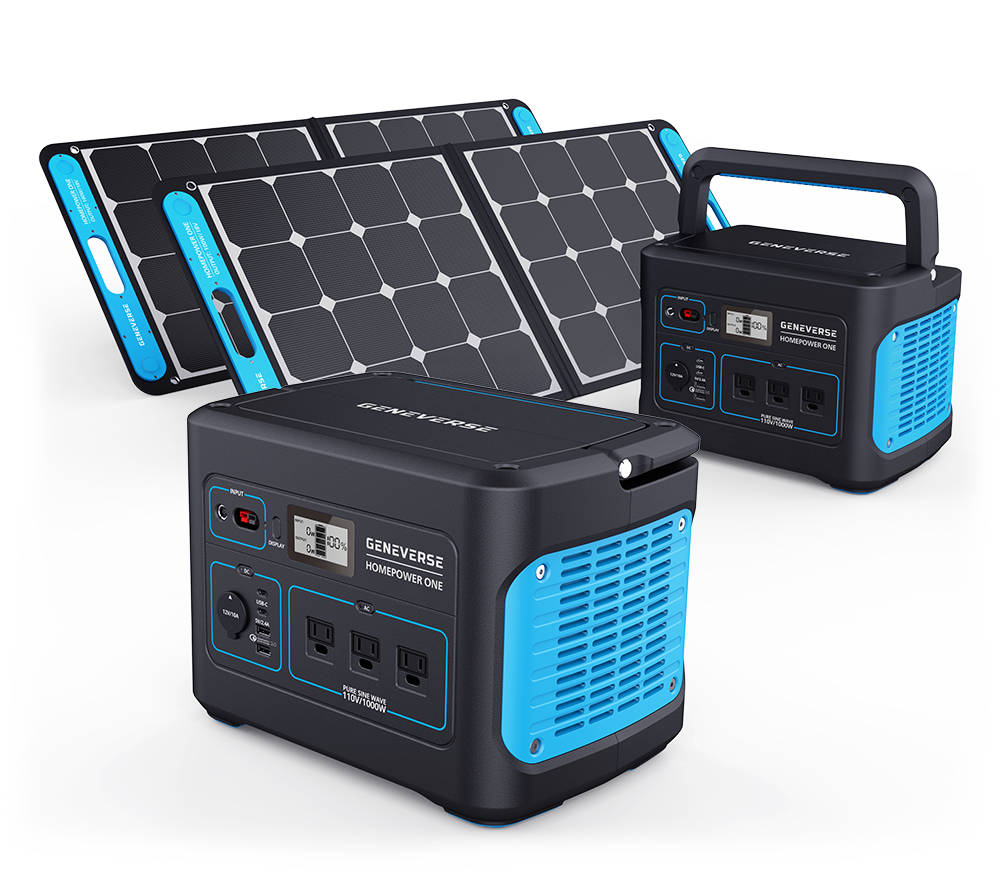The first day of summer falls on June 20th this year, which means it will be here before you know it. Before you get caught up with all the fun that the summer months have in store, it’s important to prepare your home for the weather changes that could be just around the corner.
Be sure to check that your emergency supply kit is properly stocked and ready for summer months in particular. Have plenty of water and maybe even a fan to keep the temperature cool if you lose power. The HomePower ONE portable power station can power an electrical fan and other home appliances and necessities in the case of a power outage.

As we await the upcoming summer months and prep emergency supply kits, here are some important details to keep in mind about the most common natural disasters and weather emergencies of the summer.
1. Wildfires
Each year since 2000 has seen an average of 71,300 wildfires. These fires burn an average acreage of 6.9 million. Like any fire, wildfires spread quickly and can destroy not only natural areas, but residential homes and communities, as well.
There are some key terminologies that you should be aware of if you live in a wildfire-prone area of the country. A Fire Weather Watch means you should start preparing for the event of a wildfire. A watch signifies that critical weather conditions are possible, though not imminent. Extreme Fire Behavior alerts you that fires are likely to rage out of control. These types of fires are difficult to predict because they can be erratic and dangerous. A Red Flag Warning means you need to take action, like being extremely careful with open flames. This alert would signify that wildfires are ongoing or imminent.
Ready.gov provides multiple suggestions of warning systems you can register with to receive community alerts in the event of a wildfire encroaching on your neighborhood.
2. Hurricanes
Hurricane season begins on May 15 in the Eastern Pacific and June 1 in the Atlantic and Central Pacific, ending on November 30. Even if you don’t live on a coast, you can be affected by a hurricane. Instead of being caught off guard, prepare yourself now by understanding hurricanes.
The National Weather Service has two classifications: a hurricane watch and a hurricane warning. A hurricane watch means hurricane conditions are possible in the specified area while a hurricane warning means hurricane-force winds are expected in the specified area. A hurricane watch will be announced within 48 hours of expected tropical-storm-force winds. A hurricane warning will be announced within 36 hours tropical-storm-force winds.
Hurricane conditions are classified as sustained winds of 74 miles per hour or higher. Tropical-storm-force winds are classified as sustained winds of 39 to 73 miles per hour.
3. Thunderstorms & Lightning
Thunderstorms are most common in the spring and summer, typically occurring in the afternoon or evening. There are about 100,000 thunderstorms in the US alone every year. Just about 10% of these storms are classified as severe, meaning they contain wind gusts of over 57 mph, tornadoes, or over an inch of hail.
While lightning can be seen during thunderstorms at any time of year, and sometimes even during snowstorms, lightning strikes are most common during storms in the spring and summer. It is also not uncommon for lightning showers to occur without any rainfall at all. Lightning can severely injure or kill those struck and strikes hitting land or structures can cause dangerous fires.

Summary
As the weather continues to change in the coming months, it’s important to not let your guard down when it comes to preparing your home for a natural disaster. Wildfires can happen without any warning and move through neighborhoods very quickly. Hurricanes can often be expected in the summer, but can greatly differ in severity. Thunderstorms and lightning in the summer can also be severe, and should not be brushed off as typical occurrences. With Geneverse (formerly Generark)’s HomePower ONE,your family can be prepared for a power outage that may come along with any of these emergency situations.
About Geneverse: Geneverse (formerly Generark) is the most reliablesolar generator and source of emergency backup power for your home and community. From theHomePower backup battery power station providing portable access to electricity, to theSolarPowersolar panels as a source for recharging, never be disconnected from what matters most to you. Learn more about how Geneverse and its industry-leading 5-year limited warranty can bring protection and security to your family ongeneverse.com. Never face a power outage alone, and power your home with a solar generator from Geneverse.






Leave a comment (all fields required)